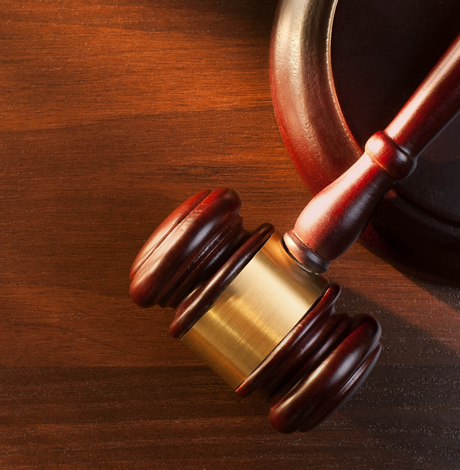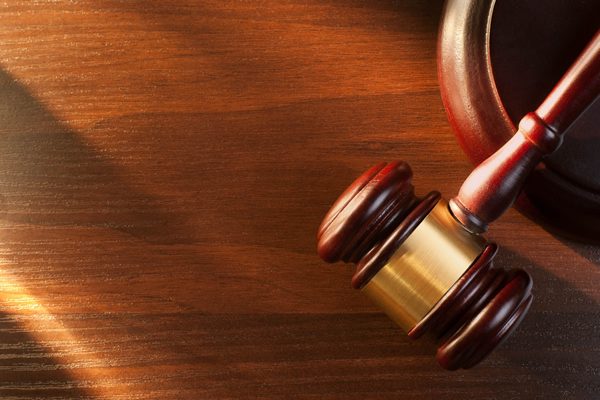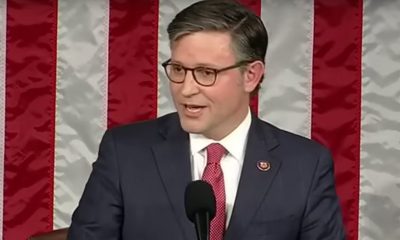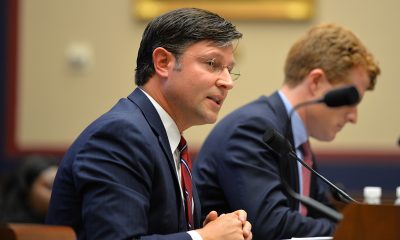National
Court affirms ruling against pro-LGBT Louisiana executive order

A state appeals court in Louisiana has affirmed Gov. John Bel Edwards’ executive order barring anti-LGBT discrimination in the state government and among state contractors is unconstitutional.
In a nine-page decision issued Wednesday, Judge Toni Higginbotham of the Louisiana First Circuit Court of Appeal for the Second District concludes the executive order violates separation of power and is an overreach of the governor’s authority.
“The governor’s executive order in this case goes beyond a mere policy statement or directive to fulfill law, because there is no current state or federal law specifically outlining anti-discrimination laws concerning and/or defining sexual orientation or gender identity,” Higginbotham writes.
The order affirms a decision issued by Judge Todd Hernandez of the 19th Judicial District Court in December as the result of a dispute between Louisiana Attorney General Jeff Landry, a Republican, and the Democratic governor.
“Having found the governor’s executive order invalid, we conclude that the district court did not err in permanently enjoining the mandatory adoption of the executive order,” the order says.
The decision also vacates the lower court ruling’s on the dispute of constitutional powers between the governor and the attorney general because, without than the issues raised by the executive order, no factual dispute exists and any ruling would constitute an advisory opinion.
The Louisiana First Circuit Court of Appeals for the Second District, located in Baton Rouge, consists of 12 judges, each of whom serve on the bench as a result of popular election, not appointment. The case was before a three-judge panel consisting of Higginbotham, Judge Guy Holdridge and Judge Allison Hopkins Penzato.
In a written note at bottom of the first page of the decision, Holdridge indicates he “concurs in the result” of the decision, but suggests he finds other implications.
Edwards signed the executive order in July 2016. It prohibits discrimination on the basis of several categories — including sexual orientation and gender identity — in state agencies in terms of services, employment and purchases of contracts and for state contractors in terms of employment. The component related to purchases of contracts and contractors had an exemption for churches and religious organizations.
In a statement after the decision, Edwards said his office “will thoroughly review the ruling before determining our next steps.”
“I have said repeatedly that discrimination is not a Louisiana value, and this decision does not change my conviction that hiring decisions in state government should be based on merit alone,” Edwards said. “Discrimination in state government and by state contractors is wrong, makes us weaker, and is bad for business and economic development.”
Edwards pointed to President Trump’s decision to keep in place an Obama-era executive order barring anti-LGBT workplace discrimination among federal contractors as evidence the state order is lawful.
“Even President Trump agrees, as he has kept in place a federal executive order which is virtually identical to the order I put in place,” Edwards said. “I went a step further and provided an exemption for certain religious organizations.”
Claiming victory, Landry said the court ruling “affirms a notion of basic civics that the legislature makes the law, not the governor.”
“We do not live under a king in Louisiana; we have a governor, an independent attorney general, an elected legislature, and a court system who are all involved in the governing of our state,” Landry said. “I applaud the professionalism and attention of the Court of Appeal in these matters.”
No state law in Louisiana protects LGBT people from discrimination in Louisiana. Now that Landry has succeeded in enjoining enforcement of executive order, LGBT people will have rely on other resources to seek recourse from discrimination, which may include local civil rights law and other non-discrimination policies. Federal law against sex discrimination, which increasingly has been interpreted to apply to LGBT people, still holds in Louisiana.
Louisiana Solicitor General Elizabeth Murrill also commended the court for ruling against Bel Edwards’ executive order in a statement.
“This dispute was always about separation of powers and executive overreach,” Murrill said. “The governor tried to make it something else and, in doing so, deflected that basic issue. Our position has been consistent – expanding the law to create new protected classes requires legislative action.”
State Department
State Department releases annual human rights report
Antony Blinken reiterates criticism of Uganda’s Anti-Homosexuality Act

Secretary of State Antony Blinken on Monday once again reiterated his criticism of Uganda’s Anti-Homosexuality Act upon release of the State Department’s annual human rights report.
“This year’s report also captures human rights abuses against members of vulnerable communities,” he told reporters. “In Afghanistan, the Taliban have limited work opportunities for women, shuttered institutions found educating girls, and increasing floggings for women and men accused of, quote, ‘immoral behavior,’ end quote. Uganda passed a draconian and discriminatory Anti-Homosexuality Act, threatening LGBTQI+ individuals with life imprisonment, even death, simply for being with the person they loved.”
Ugandan President Yoweri Museveni last May signed the law, which contains a death penalty provision for “aggravated homosexuality.”
The U.S. subsequently imposed visa restrictions on Ugandan officials and removed the country from a program that allows sub-Saharan African countries to trade duty-free with the U.S. The World Bank Group also announced the suspension of new loans to Uganda.
Uganda’s Constitutional Court earlier this month refused to “nullify the Anti-Homosexuality Act in its totality.” More than a dozen Ugandan LGBTQ activists have appealed the ruling.
Clare Byarugaba of Chapter Four Uganda, a Ugandan LGBTQ rights group, on Monday met with National Security Council Chief-of-Staff Curtis Ried. Jay Gilliam, the senior LGBTQI+ coordinator for the U.S. Agency for International Development, in February traveled to Uganda and met with LGBTQ activists who discussed the Anti-Homosexuality Act’s impact.
“LGBTQI+ activists reported police arrested numerous individuals on the basis of their sexual orientation or gender identity and subjected many to forced anal exams, a medically discredited practice with no evidentiary value that was considered a form of cruel, inhuman, and degrading treatment and could amount to torture,” reads the human rights report.
The report, among other things, also notes Ugandan human rights activists “reported numerous instances of state and non-state actor violence and harassment against LGBTQI+ persons and noted authorities did not adequately investigate the cases.”
Report highlights anti-LGBTQ crackdowns in Ghana, Hungary, Russia
Ghanaian lawmakers on Feb. 28 approved the Promotion of Proper Human Sexual Rights and Ghanaian Family Values Bill. The country’s president, Nana Akufo-Addo, has said he will not sign the measure until the Ghanaian Supreme Court rules on whether it is constitutional or not.
The human rights report notes “laws criminalizing consensual same-sex sexual conduct between adults” and “crimes involving violence or threats of violence targeting lesbian, gay, bisexual, transgender, queer or intersex persons” are among the “significant human rights issues” in Ghana.
The report documents Hungarian Prime Minister Viktor Orbán and members of his right-wing Fidesz party’s continued rhetoric against “gender ideology.” It also notes Russia’s ongoing crackdown against LGBTQ people that includes reports of “state actors committed violence against LGBTQI+ individuals based on their sexual orientation or gender identity, particularly in Chechnya.”
The report specifically notes Russian President Vladimir Putin on July 24 signed a law that bans “legal gender recognition, medical interventions aimed at changing the sex of a person, and gender-affirming care.” It also points out Papua New Guinea is among the countries in which consensual same-sex sexual relations remain criminalized.

The Cook Islands and Mauritius in decriminalized homosexuality in 2023.
The report notes the Namibia Supreme Court last May ruled the country must recognize same-sex marriages legally performed outside the country. The report also highlights the Indian Supreme Court’s ruling against marriage equality that it issued last October. (It later announced it would consider an appeal of the decision.)
Congress requires the State Department to release a human rights report each year.
The Biden-Harris administration in 2021 released a memorandum that committed the U.S. to promoting LGBTQ+ and intersex rights abroad.
The full report can be read here.
National
Same-sex couples vulnerable to adverse effects of climate change
Williams Institute report based on Census, federal agencies

A new report by the Williams Institute at the UCLA School of Law finds that same-sex couples are at greater risk of experiencing the adverse effects of climate change compared to different-sex couples.
LGBTQ people in same-sex couple households disproportionately live in coastal areas and cities and areas with poorer infrastructure and less access to resources, making them more vulnerable to climate hazards.
Using U.S. Census data and climate risk assessment data from NASA and the Federal Emergency Management Agency, researchers conducted a geographic analysis to assess the climate risk impacting same-sex couples. NASA’s risk assessment focuses on changes to meteorological patterns, infrastructure and built environment, and the presence of at-risk populations. FEMA’s assessment focuses on changes in the occurrence of severe weather events, accounting for at-risk populations, the availability of services, and access to resources.
Results show counties with a higher proportion of same-sex couples are, on average, at increased risk from environmental, infrastructure, and social vulnerabilities due to climate change.
“Given the disparate impact of climate change on LGBTQ populations, climate change policies, including disaster preparedness, response, and recovery plans, must address the specific needs and vulnerabilities facing LGBTQ people,” said study co-author Ari Shaw, senior fellow and director of international programs at the Williams Institute. “Policies should focus on mitigating discriminatory housing and urban development practices, making shelters safe spaces for LGBT people, and ensuring that relief aid reaches displaced LGBTQ individuals and families.”
“Factors underlying the geographic vulnerability are crucial to understanding why same-sex couples are threatened by climate change and whether the findings in our study apply to the broader LGBTQ population,” said study co-author Lindsay Mahowald, research data analyst at the Williams Institute. “More research is needed to examine how disparities in housing, employment, and health care among LGBT people compound the geographic vulnerabilities to climate change.”
Read the report
Federal Government
Lambda Legal praises Biden-Harris administration’s finalized Title IX regulations
New rules to take effect Aug. 1

The Biden-Harris administration’s revised Title IX policy “protects LGBTQ+ students from discrimination and other abuse,” Lambda Legal said in a statement praising the U.S. Department of Education’s issuance of the final rule on Friday.
Slated to take effect on Aug. 1, the new regulations constitute an expansion of the 1972 Title IX civil rights law, which prohibits sex-based discrimination in education programs that receive federal funding.
Pursuant to the U.S. Supreme Court’s ruling in the landmark 2020 Bostock v. Clayton County case, the department’s revised policy clarifies that discrimination on the basis of sexual orientation and gender identity constitutes sex-based discrimination as defined under the law.
“These regulations make it crystal clear that everyone can access schools that are safe, welcoming and that respect their rights,” Education Secretary Miguel Cardona said during a call with reporters on Thursday.
While the new rule does not provide guidance on whether schools must allow transgender students to play on sports teams corresponding with their gender identity to comply with Title IX, the question is addressed in a separate rule proposed by the agency in April.
The administration’s new policy also reverses some Trump-era Title IX rules governing how schools must respond to reports of sexual harassment and sexual assault, which were widely seen as imbalanced in favor of the accused.
Jennifer Klein, the director of the White House Gender Policy Council, said during Thursday’s call that the department sought to strike a balance with respect to these issues, “reaffirming our longstanding commitment to fundamental fairness.”
“We applaud the Biden administration’s action to rescind the legally unsound, cruel, and dangerous sexual harassment and assault rule of the previous administration,” Lambda Legal Nonbinary and Transgender Rights Project Director Sasha Buchert said in the group’s statement on Friday.
“Today’s rule instead appropriately underscores that Title IX’s civil rights protections clearly cover LGBTQ+ students, as well as survivors and pregnant and parenting students across race and gender identity,” she said. “Schools must be places where students can learn and thrive free of harassment, discrimination, and other abuse.”
-

 South America4 days ago
South America4 days agoDaniel Zamudio murderer’s parole request denied
-

 Maryland4 days ago
Maryland4 days agoMontgomery County police chief discusses arrest of trans student charged with planned school shooting
-

 Commentary5 days ago
Commentary5 days agoWorld ‘isn’t much different today’
-

 Theater4 days ago
Theater4 days ago‘Amm(i)gone’ explores family, queerness, and faith













